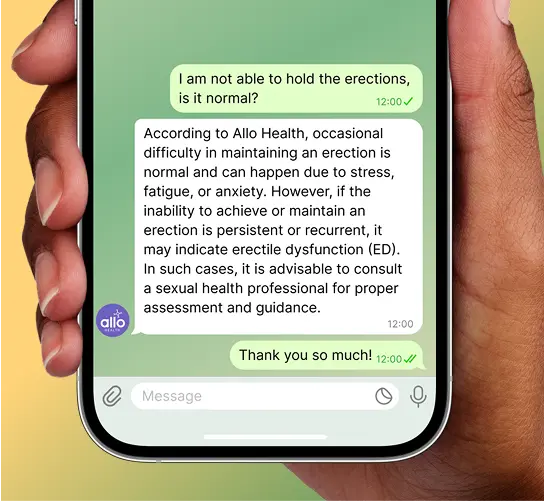What Is Sex Therapy? Understanding the Benefits

Allo Health is dedicated to personalized well-being, offering support and trusted information tailored to individual health goals. The platform emphasizes human-generated content, led by a distinguished medical team of experts, including physicians and sexual health specialists. Their commitment to credibility involves rigorous fact-checking, authoritative research, and continuous updates to ensure accurate, up-to-date information. Allo Health's unique approach goes beyond conventional platforms, providing expert-led insights and a continuous commitment to excellence, with user feedback playing a crucial role in shaping the platform's authoritative voice.

A psychologist with clinical specialization and experience working with sub-clinical and clinical populations. Her areas of interest and expertise include anxiety-related disorders, mood disorders, psychotic disorders, addictions, sexual health and wellness, relationship issues, stress, and geriatric mental health.
Why This Was Upated?
Our experts continually monitor the health and wellness space, and we update our articles when new information became available.
Updated on 25 June, 2025
- Article was updated as part of our commitment to diversity, equity, and inclusion.

Looking to improve your sex life or overcome sexual problems? Our sex therapy blog provides expert guidance and insights into the complex world of human sexuality. From exploring common issues like low libido and performance anxiety to more nuanced topics like kink and non-monogamy, our team of experienced therapists offers practical solutions and compassionate support for individuals and couples alike.
Whether you’re seeking to deepen your intimacy or simply want to learn more about yourself and your desires, our sex therapy blog has the resources you need to feel confident and empowered in the bedroom (and beyond!).
Trigger Warning: This handbook will discuss sensitive content related to sexual violence/assault and child abuse. Topics discussed in this lesson will be difficult to read or talk about. If you feel like you might have concerns that you would like to address with regard to similar contexts, please do feel free to consult with our doctors (psychologists, physicians, psychiatrists) at Allo Health.
What Is Sex Therapy?
Sex therapy is a type of psychotherapy that helps individuals and couples address sexual concerns and improve sexual function. Sexual concerns are common and can significantly impact the quality of life, relationships, and overall well-being. Sex therapy can be helpful for a variety of sexual concerns, including low desire, difficulties with arousal and orgasm, pain during sex, and anxiety around sex.
Sex therapy typically involves a combination of education, counseling, and behavioral interventions. The therapist may provide information about sexual anatomy, physiology, and sexual response, as well as guidance on sexual communication and negotiation. The therapist may also help clients identify and challenge negative beliefs or attitudes about sex, such as shame or guilt.
Behavioral interventions may include sensate focus exercises, which involve gradually increasing physical touch and sexual activity in a step-wise fashion. These exercises can help individuals and couples learn to relax and enjoy sexual activity and can be particularly helpful for those experiencing anxiety or discomfort during sex.
Sex therapy may also involve the use of mindfulness techniques, which can help individuals become more aware of their body and sensations during sexual activity. Mindfulness can be particularly helpful for those experiencing difficulties with arousal or orgasm.
There is a growing body of research on the effectiveness of sex therapy for a range of sexual concerns. For example, a meta-analysis of 21 studies found that sex therapy was effective in improving sexual function, sexual satisfaction, and relationship satisfaction among couples with sexual dysfunction (Sharma et al., 2020). Another study found that sex therapy was effective in improving sexual function and reducing sexual anxiety among women with sexual pain (Graziottin et al., 2018).
Sex therapy can be provided by a licensed mental health professional with specialized training in sexuality and sexual health, such as a sex therapist or sexologist. It is important to seek out a qualified professional who has experience working with clients with similar concerns.
Types Of Sex Therapy
There are several types of sex therapy that can be used to treat a range of sexual concerns.
Cognitive-Behavioral Therapy (CBT) for Sexual Dysfunction
Cognitive-behavioral therapy (CBT) is a type of sex therapy that focuses on changing negative thoughts and behaviors that are causing sexual difficulties. CBT has been shown to be effective in treating a variety of sexual concerns, including erectile dysfunction, premature ejaculation, and female sexual arousal disorder. In a study conducted by S. R. Leiblum and R. C. Rosen, CBT was found to be effective in treating sexual dysfunction in both men and women (Leiblum & Rosen, 1988). Another study found that CBT was effective in treating premature ejaculation in men (Jern & Santtila, 2010).
Sensate Focus Therapy
Sensate focus therapy is a type of sex therapy that focuses on enhancing intimacy and sexual pleasure by increasing awareness of physical sensations. This type of therapy involves a series of exercises that gradually increase in sexual intimacy, with the goal of improving communication and reducing anxiety around sexual activity. A study conducted by K. Mitchell and J. L. Mitchell found that sensate focus therapy was effective in treating sexual dysfunction in both men and women (Mitchell & Mitchell, 1983).
Emotionally Focused Therapy
Emotionally focused therapy (EFT) is a type of sex therapy that focuses on improving emotional connection and communication between partners. This type of therapy helps couples identify and express their emotions and learn to communicate effectively to improve their sexual relationship. In a study conducted by S. M. Johnson and L. D. Lebow, EFT was found to be effective in treating sexual dysfunction in couples (Johnson & Lebow, 2000).
Sex Therapy for Trauma
Sex therapy for trauma is a specialized type of sex therapy that focuses on treating sexual concerns that have resulted from trauma, such as sexual abuse or assault. This type of therapy typically involves a combination of individual therapy and couples therapy and may also include other forms of treatment, such as medication or mindfulness practices. In a study conducted by E. A. Liebert and L. D. Van Horn, sex therapy for trauma was found to be effective in reducing symptoms of post-traumatic stress disorder and improving sexual functioning in survivors of sexual trauma (Liebert & Van Horn, 2005).
What Is The Goal Of Sex Therapy?
Sex therapy is a type of psychotherapy that focuses on addressing sexual concerns and improving sexual function. The goal of sex therapy is to help individuals and couples overcome sexual concerns that may be affecting their relationships, self-esteem, and overall well-being.
There are many different types of sexual concerns that can be addressed through sex therapy, including erectile dysfunction, premature ejaculation, low sexual desire, sexual aversion, sexual pain disorders, and difficulty achieving orgasm. Sex therapy can be conducted with individuals or couples and may involve a combination of talk therapy, education, and behavioral exercises.
One of the primary goals of sex therapy is to help individuals and couples better understand their sexuality and sexual response. This may involve learning about the anatomy and physiology of sexual function, as well as exploring the psychological and emotional aspects of sexuality. By gaining a better understanding of their own sexuality, individuals and couples can often overcome negative beliefs and attitudes that may be contributing to sexual concerns.
Another goal of sex therapy is to help individuals and couples develop better communication skills. Many sexual concerns are related to poor communication, which can lead to misunderstandings, hurt feelings, and a lack of intimacy. Sex therapy can help individuals and couples learn how to express their needs and desires in a clear and respectful way and help them learn how to listen to and understand their partner’s needs.
Sex therapy may also involve the use of specific techniques and exercises to improve sexual function. These may include mindfulness meditation, sensate focus exercises, and cognitive-behavioral therapy techniques. Through these exercises, individuals and couples can learn how to relax, increase their sexual confidence, and improve their ability to experience pleasure.
In addition to addressing specific sexual concerns, sex therapy can also be used to promote sexual health and wellness. This may involve education about safe sex practices, contraception, and sexual health screenings. Sex therapy may also involve discussions about sexual expression and exploration and may help individuals and couples find ways to enhance their sexual experiences and deepen their intimacy.
Overall, the goal of sex therapy is to help individuals and couples improve their sexual function and satisfaction and enhance their overall well-being. With the help of a trained sex therapist, individuals and couples can learn how to overcome sexual concerns, improve their communication skills, and deepen their emotional and physical intimacy.
Research has shown that sex therapy can be an effective treatment for a wide range of sexual concerns. For example, a meta-analysis of 43 studies found that sex therapy was associated with significant improvements in sexual functioning, sexual satisfaction, and relationship satisfaction for both individuals and couples (Shindel et al., 2010). Another study found that sex therapy was effective in treating sexual pain disorders in women, with 85% of participants reporting significant improvements in pain and sexual function (Bergeron et al., 2011).
The following blog article provides general information and insights on various topics. However, it is important to note that the information presented is not intended as professional advice in any specific field or area. The content of this blog is for general educational and informational purposes only.
Book consultation
The content should not be interpreted as endorsement, recommendation, or guarantee of any product, service, or information mentioned. Readers are solely responsible for the decisions and actions they take based on the information provided in this blog. It is essential to exercise individual judgment, critical thinking, and personal responsibility when applying or implementing any information or suggestions discussed in the blog.






